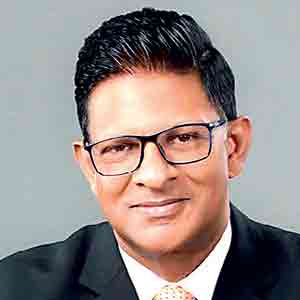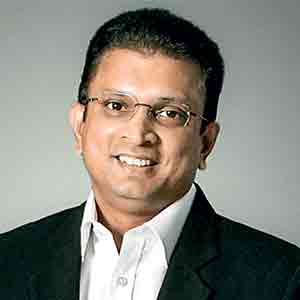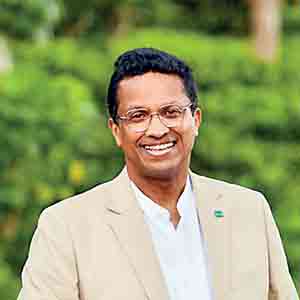Saturday Feb 21, 2026
Saturday Feb 21, 2026
Tuesday, 23 September 2025 01:00 - - {{hitsCtrl.values.hits}}
 |
 |
 |
| Network Sri Lanka Executive Director Rathika de Silva | Dialog Axiata Executive Director/Group CEO and Network Sri Lanka Board Member Supun Weerasinghe | Dilmah Ceylon Tea Company Chairman/CEO and Network Sri Lanka Chairman Dilhan C. Fernando |
On the invitation of United Nations Secretary-General António Guterres, three representatives from UN Global Compact Network Sri Lanka (Network Sri Lanka) participated yesterday in the 2025 United Nations Private Sector Forum (PSF), a high-level roundtable that brings together a select group of global private sector leaders to drive forward sustainable economic growth, held as a high-level convening during UN General Assembly Week in New York.
Representing Sri Lanka at this year’s Forum are Dilmah Ceylon Tea Company PLC Chairman/CEO and Network Sri Lanka Chairman Dilhan C. Fernando. Dialog Axiata PLC Executive Director/Group CEO and Network Sri Lanka Board Member Supun Weerasinghe, and Network Sri Lanka Executive Director Rathika de Silva.
They joined a distinguished group of 50 global corporate CEOs, Government leaders, UN Principals, and the UN Secretary-General in New York yesterday to discuss how private sector finance and investments can be mobilised for sustainable, inclusive growth.
A critical year for collective action
The 2025 UN Private Sector Forum takes place at a pivotal moment for the world economy and the global development agenda. The year 2025 marks 10 years since the adoption of the 2030 Agenda for Sustainable Development, when world leaders pledged to ensure the rights and well-being of people everywhere on a thriving planet. It also marks 25 years since the late UN Secretary-General Kofi Annan called on businesses to join forces with Governments and civil society through the UN Global Compact, sparking a movement towards more ethical and inclusive markets.
This year is also significant as it will see a series of major international milestones, including the 4th International Conference on Financing for Development, the Food Systems Summit, the World Social Summit, and COP30. Each of these processes spotlights the urgency of forging stronger partnerships between the private sector and multilateral institutions to achieve a just transition and ensure long-term economic resilience.
The Forum will convene during a period marked by climate disruption, rapid technological transformation, economic uncertainty, and heightened geopolitical tensions. These forces are reshaping how economies grow, how businesses operate, and how communities adapt.
As the UN Secretary-General emphasised in his recent special address, this is a moment of great opportunity that must be seized by all stakeholder groups—through increased investments in energy infrastructure and high-tech solutions, the modernisation of trade and investment agreements, reforms to the global financial architecture, and by ensuring that, while working quickly toward a green energy transition, equity, dignity, and opportunity are delivered for all.
This call to action is being echoed by the private sector. The upcoming 2025 UN Global Compact–Accenture CEO Study reveals that 66% of CEOs remain strongly committed to the Sustainable Development Goals (SDGs). CEOs are increasingly refusing to wait for perfect conditions; instead, they are acting despite uncertainty, recognising that delay heightens risk and erodes long-term value. The study highlights a clear shift in mindset: sustainability is no longer treated as a compliance burden, but as a driver of profitability, innovation, and resilience.
For Sri Lanka, a nation navigating its path toward economic stabilisation and sustainable recovery, the relevance of this conversation is profound. The participation of Network Sri Lanka’s leadership at PSF highlights the country’s recognition that private capital, innovation, and corporate responsibility must be central to rebuilding resilience and unlocking growth opportunities.
Sri Lanka at the table
Network Sri Lanka’s representation at the PSF demonstrates the growing visibility of the country’s private sector in multilateral decision-making spaces. It reflects a recognition that Sri Lankan companies, while operating in a small market, play a vital role in addressing challenges that transcend borders – from sustainable agriculture and food systems to digital inclusion and climate adaptation.
Why the UN Private Sector Forum matters
Since its inception, the UN Private Sector Forum has been a unique platform where business leaders, heads of state, and senior UN officials engage in candid dialogue on how to accelerate progress toward shared goals. Unlike other global summits, the PSF is not just a stage for commitments – it is a working roundtable where ideas are exchanged, solutions proposed, and partnerships forged.
The 2025 edition will focus specifically on unlocking private capital for sustainable and inclusive growth. With trillions of dollars required annually to meet the SDGs, the Forum will explore how businesses can align investments with global priorities such as climate action, food security, digital innovation, and more, resonating deeply with Sri Lanka’s national development priorities.
A message to Sri Lanka and beyond
Network Sri Lanka’s participation at the UN PSF is more than an international appearance – it is a signal that Sri Lanka is engaging with the world at a critical juncture, determined to contribute to and benefit from the global transition toward sustainability.
As the UN marks key anniversaries in 2025 – ten years since the 2030 Agenda and twenty-five years since the founding of the UN Global Compact – the presence of Sri Lankan leaders affirms that the country is part of this collective journey.
Through this engagement, Network Sri Lanka seeks to inspire more Sri Lankan businesses to align with global sustainability standards, deepen partnerships across sectors, and position Sri Lanka as a credible partner in the global effort to build a just, inclusive, and thriving future.